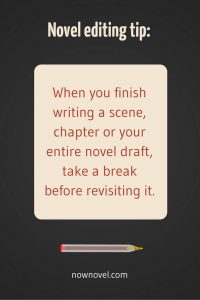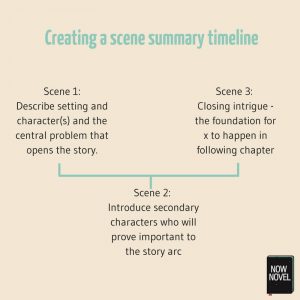Editing novel drafts requires a specific set of skills. It's wise to use a professional editor if you are serious about getting published. Even so, editing your manuscript well before you share your first draft with an editor will save time by streamlining the book editing process. Here are 8 tips for editing your own novel like a pro:
1: Be a champion of great grammar and punctuation
Not sure when to use a semi-colon or a comma? Never heard of 'parallel construction'? There are countless free resources for improving your grammar and punctuation. To become a ruthless book editor, you need to know how to write the clearest, highest impact sentences.
To improve your grammar and punctuation and become a better fiction editor:
- Pick an item of punctuation every day (such as parentheses) and read up about all uses. Practice writing sentences incorporating each use
- Revise every element of grammar (e.g. the parts of speech and clause and sentence structure) regularly, paying extra attention to the sub-topics that challenge you most
- Use .edu websites' grammar and punctuation guides (such as this grammar guide via the Purdue Online Writing Lab) to fill any gaps in your grammar and punctuation knowledge
2: Understand the different types of editing and why they matter for your novel
There are different types of book editing. It's also important to understand the difference between revision and editing. Editing:
- Addresses sentence-level problems (e.g. spelling, grammar, punctuation, or word choice)
- Is typically not a process of dialogue (when you work with a novel editor rather than self-edit) - an editor finds mistakes and creates effective substitutions
Each type of editing serves an important purpose for your book:
- Proofreading: This is the lightest form of editing. Proofreaders only focus on minor errors. This eliminates embarrassing textual errors such as typos. These can include grammar errors (such as incorrect tense use), punctuation errors (such as inappropriate use of colons, periods and apostrophes) or spelling and word use mistakes
- Copy editing: This type of editing also includes editing for style (making sure the elements of writing such as word choice fit the subject and target audience, for example). Copy editing spruces up your writing more
- Substantive or developmental editing: This is the most comprehensive kind of editing. Substantive editors work on your novel as a whole. Problems in your structure, consistency, coherence and style may be edited, both within sentences and paragraphs and between chapters and other divisions. Because this is the most complex and thorough form of book editing, its also costs the most
Revising a novel, compared to editing, is more focused on how you tell your story and connect its threads. When you revise your novel, you might add new scenes to clarify character motivations, for example, or replace words that aren't conveying enough affect with more descriptive alternatives. Revision is typically more of a back and forth exchange than substantive editing. This is the stage where writing groups and writing coaches can help you perfect your book by giving helpful feedback.
You can revise work in progress with the help of Now Novel's online writing groups. If you like one-on-one collaboration and dialogue, and being held accountable to your goals, you can work with a Now Novel writing coach. It's always a good idea to spend time revising your novel thoroughly before you send it to editors, so that even in its most basic form your manuscript shines.
3: Note your most frequent writing mistakes and stay alert to them
If you always get feedback from your writing group on the same topics (such as forgetting to close speech marks), note down these errors. Make your own 'my most common writing mistakes' checklist and prioritize checking for these as you go. This will give you less mundane editing to do when you are finished a draft because you'll have caught simple errors already.
4: Cut unnecessary words
Always cut unnecessary words that add nothing to the meaning or descriptive value of a sentence. These include:
- Semantic repetition (e.g. 'She replied back' - 'back' should be cut because the element of response is already conveyed by the word 'replied')
- Vague descriptors (e.g. 'A really, really big dog knocked me down'. 'Really, really' is imprecise. Instead, find a one-word synonym for 'really big' such as 'enormous' or 'monstrous')
- Unnecessary literary devices (if it's clear who's speaking in dialogue, for example, you don't need to include 'he said' or 'she said' at the end of each line by default)
- Read Diana Urban's useful list of 43 words you should cut from your writing immediately
Make every word in every sentence count. This ensures your writing flows, giving readers a better experience. This is essential if you want readers (especially those employed by publishing houses) to reach your final page.
5. Always take a break before editing novel drafts

If you've recently finished a scene, chapter or your entire novel draft, take a break before revisiting it. How you feel about your writing while you're in the thick of it will change when you return with fresh eyes.
Why take a break? Because you might see how parts of your manuscript that seemed Booker-winning material are clunky and don't fit your primary story arcs. You might also find language errors that you've become used to glossing over due to the familiarity of your text.
When you finish writing a scene or chapter, accelerate the process by getting feedback from your writing group or mentor. While your eyes might need a break, another writer who's seeing the text for the first time can jump straight in and spot any weak parts that have escaped your attention.
6: Ask yourself how each scene and chapter moves the story forward
One of the crucial reasons to edit your novel is to make sure each component of the book actively contributes to the whole. Readers quickly become frustrated if a story meanders. No dialogue or action should be included 'just because'. Dialogue and action need to be linked to characterization and plot development. Editor Jen Blood, in conversation with USA Today bestselling author Joanna Penn, gives the following advice for editing your own novel:
'Sit down and make a list of every scene in your book. What happens in each one? How does it relate to the book’s central, secondary, or tertiary plotlines? How long does each scene go on? Every scene in your novel, regardless of the genre, should be active and should move your story forward.'
If you aren't yet at a stage where it makes sense to invest in comprehensive editing services, get feedback from your online writing community regarding whether or not each scene hangs together.
7: Revise and edit story beginnings and endings last
Focus on your novel's beginning and ending once you know what happens in the course of the book and have cut elements that don't drive your story forward. This way, you can ensure the introduction sets up the right expectations for what's to come. You'll also ensure your ending satisfyingly answers some of the primary questions raised in the course of your story.
One useful strategy is to experiment with cutting the first paragraph of every new chapter. Often, we take a while to get into the swing of writing a long piece of narrative. If your beginnings tend to simply rehash a preceding scene, this exercise could prove helpful.
8: Step back and outline to make sure you can see the total structure of your story
Even if you write a plot outline at the start of writing a novel, there may come a point where you are so buried in writing scenes and chapters that you lose sight of the whole. Periodically step back and outline your novel up to where you are now, summarising the basic action and plot events of every single scene. It may be helpful to condense the scene structure of each chapter on a timeline:

This will make sure that you keep a clear view of how your story fits together. Because substantive novel editing services are a premium service, it makes sense to solve structural problems yourself as much as possible before you hire a book editor.
Start getting helpful feedback from the Now Novel community, where aspiring authors of all skill levels exchange insights.
What is your favourite editing tip?
Do you need thorough, thoughtful and constructive feedback on your finished draft (or what you have so far)?
Learn about our editing services and request a no-obligation quote here.










Taking that break before taking the next step is probably the best thing I can do. I do medical transcription twice a week (14 yrs) for a free clinic. I always take a break after setting up the transcription document, made from Excel and Mail Merge, before starting the actual transcription, even when I only have a day to do the work. Transcription is tough work. Even with my experience, they ALWAYS find some term I haven't run into before. Thank goodness for Medical spell check and the Internet. Then as I type, I try to make certain the transcription is clear and catch any minor errors.
Njn - Over 9 years ago
Thanks for sharing your experience, njn. That does sound gruelling.
Bridget At Now Novel - Over 9 years ago
Excellent advice. I like the idea of experimenting with cutting the first paragraph of each chapter - I'll try that when I edit the draft I'm currently working on. Also, the tips on taking a step back to review the structure of your book are very helpful. I like to think of the main drive of the story as a simplistic 'intention' and 'obstacle' construction, with each chapter driving towards the resolution of the intention. It works for me!
Neil Bailey - Over 9 years ago
Thanks very much, Neil. I like the 'intention' and 'obstacle' paradigm - definitely a useful way to make sure every scene relates to your central story premise. Thanks for sharing your process.
Bridget At Now Novel - Over 9 years ago
Thanks for sharing your valuable information on Novel editing.
Jatil - About 5 years ago